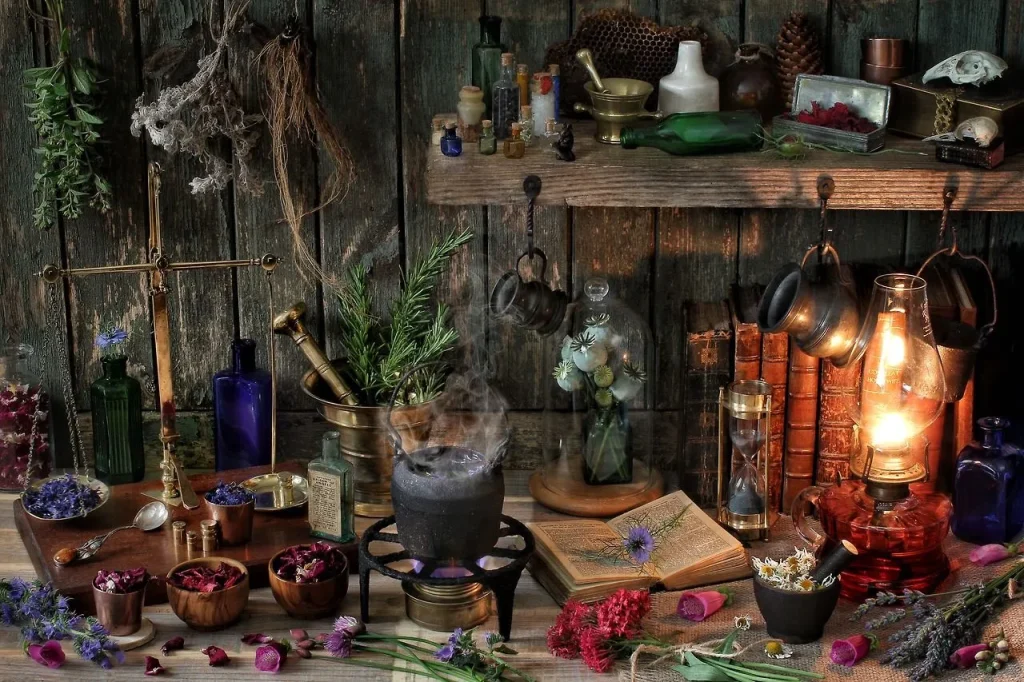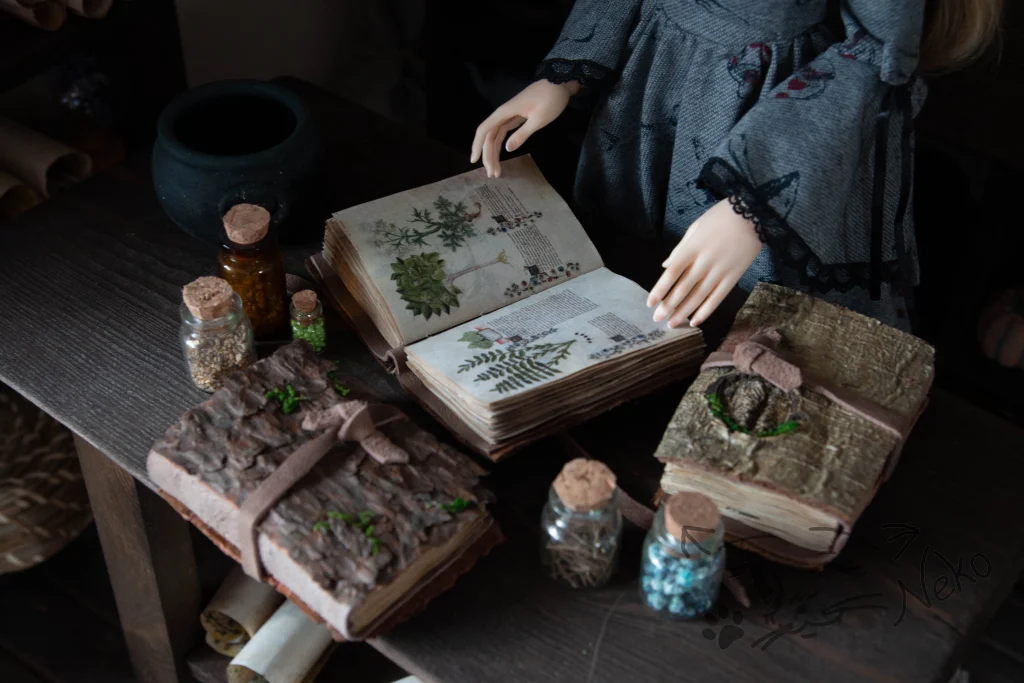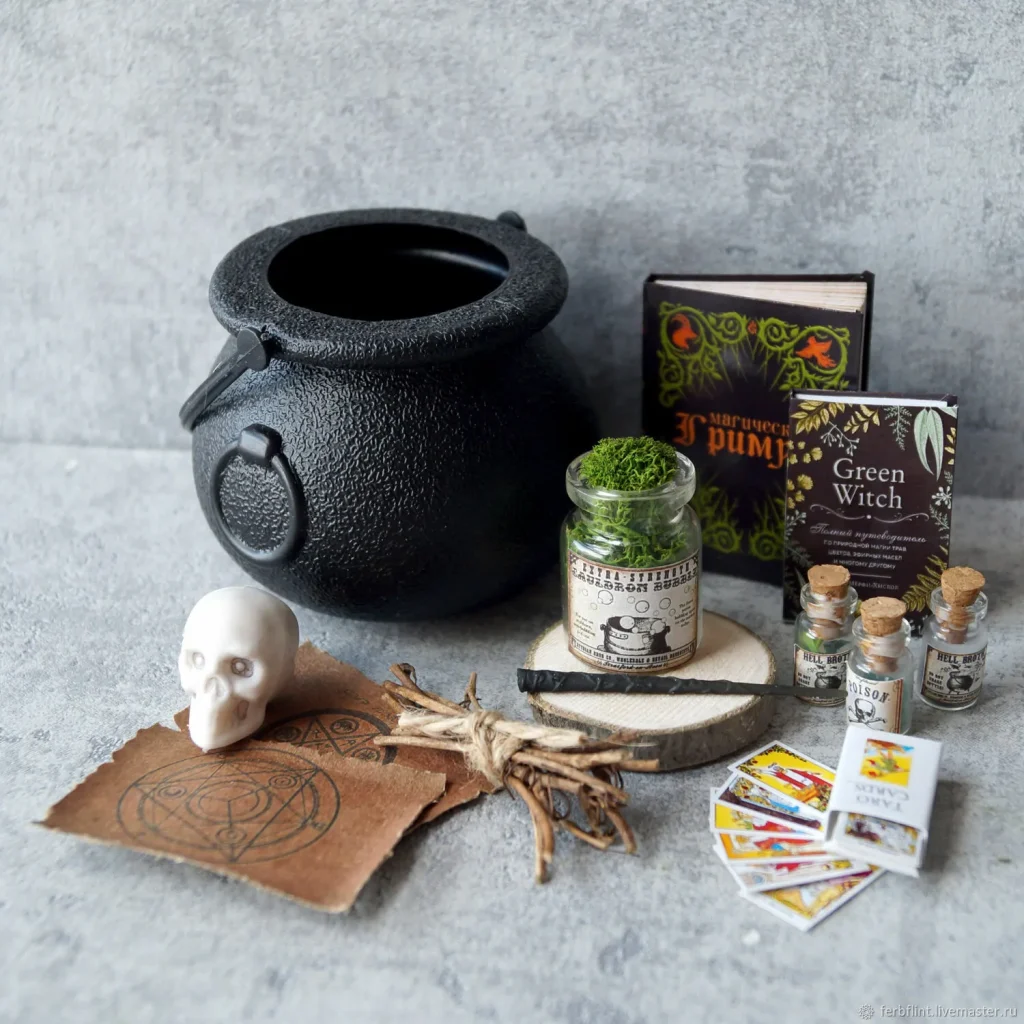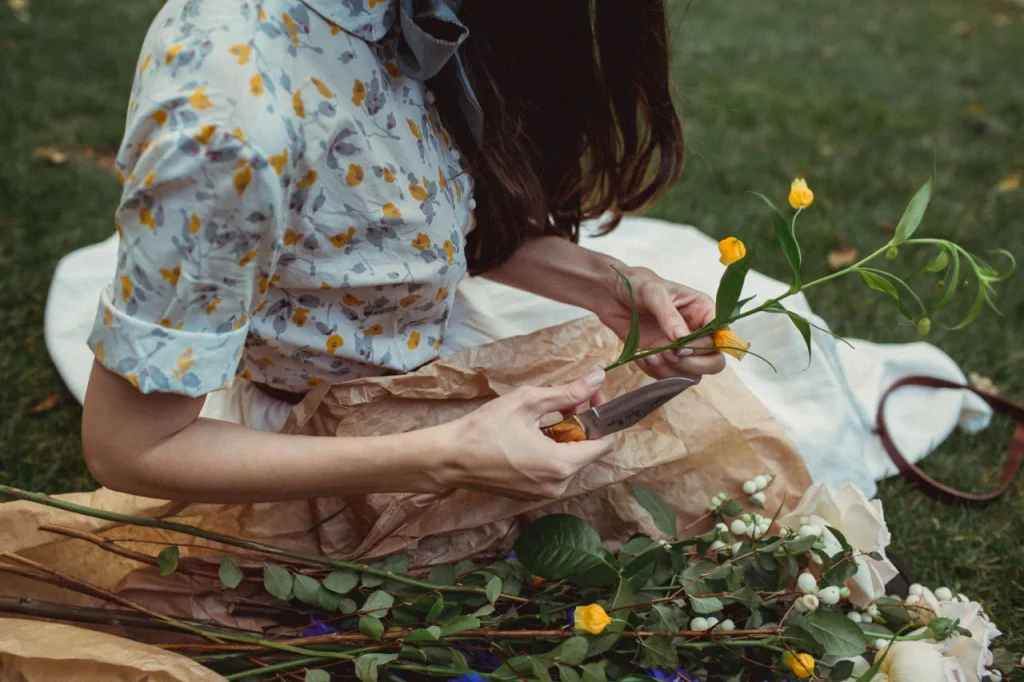The practice of using herbs for spells is deeply rooted in ancient wisdom, with each herb possessing its own unique energy and properties. In the practice of spellwork, herbs play a crucial role, adding potency, symbolism, and intention to our rituals. In this article, we will explore the world of herbs for spells, highlighting their specific magickal properties and how they can be incorporated into your spellcasting practice.
The Historical Significance of Using Herbs for Spells
The historical significance of using herbs for spells is a fascinating aspect of the practice, deeply rooted in the traditions and beliefs of ancient civilizations. Here, let’s delve deeper into this historical context:
- Ancient Civilizations: The use of herbs for magical spells and spiritual purposes dates back to ancient civilizations such as the Egyptians, Greeks, and Romans. These cultures held strong beliefs in the power of nature and its connection to the divine. Herbs were considered gifts from the gods and were used not only for medicinal purposes but also in religious ceremonies and magical rituals.
- Spiritual Connection: Many ancient cultures believed that herbs had spiritual or supernatural properties. They associated specific herbs with various deities or celestial forces, attributing them with the ability to invoke or channel these energies. This belief laid the foundation for the use of herbs in spellcasting.
- Healing and Protection: In these early civilizations, herbs were not only used for spiritual purposes but also for practical ones. They were integral to healing practices and protection spells. Priests, priestesses, and shamans used herbs to cure ailments, ward off evil spirits, and protect individuals and communities from harm.
- Alchemy and Herbalism: During the Middle Ages, the practice of alchemy and herbalism gained prominence in Europe. Alchemists sought to unlock the secrets of the universe, and herbs played a significant role in their experiments. This period also saw the development of grimoires, wiccan books of magic that often included instructions on using herbs in spells and rituals.
- Witchcraft Trials: The historical association of herbs with magic and witchcraft also played a role in the infamous witch trials of the 16th and 17th centuries. Many accused witches were believed to use herbs in their spells and potions. This dark chapter in history demonstrates the profound fear and fascination society had with the power of herbs in spellwork.
- Cultural Diversity: It’s important to note that the use of herbs for spells is not limited to Western cultures. Indigenous cultures around the world have their own rich traditions of herbal magic and shamanic practices. These traditions vary widely in their beliefs and practices but share a common thread of using herbs as conduits to the spiritual realm.
- Modern Revival: In recent decades, there has been a resurgence of interest in herbal magic and witchcraft. People from diverse backgrounds are revisiting these ancient practices, adapting them to modern spirituality, and finding connection and empowerment through the use of herbs in spellcasting even having herbs for money spells.


In summary, the historical significance of using herbs for spells spans across cultures and millennia. It reflects humanity’s deep-seated connection to nature, spirituality, and the belief that herbs possess unique energies and properties that can be harnessed for healing, protection, and the manifestation of desires. This rich history continues to influence and inspire contemporary practitioners of herbal magic today.
Read More : Powerful Job Spells to Attract Your Dream Career
Best Herbs for Spells
here are some of the best herbs for common types of spells and how to use them:
- Herbs for Spells of Love:
- Rose: Rose petals are associated with love and passion and they even call it herbs for love spells. They can be used to attract love, enhance romantic relationships, or bring harmony to existing partnerships. Scatter dried rose petals in your bedroom or create a sachet to carry with you.
- Lavender: Lavender is one of the best herbs for spells known for its calming and soothing properties. It can be used to attract love and promote relaxation. Create a sachet of dried lavender flowers and carry it with you or place it under your pillow.
- Vanilla: Vanilla is often used in love spells due to its sweet and comforting scent. You can use vanilla oil to anoint candles or create love-infused bath rituals.
- Herbs for Spells of Protection :
- Salt: While not an herb, salt is a potent protective ingredient. Sprinkle it around your home’s entrances to create a barrier against negative energy or unwanted influences.
- Bay Leaves: Bay leaves are believed to have protective properties. Write your intention on a bay leaf and burn it to release your protective spell into the universe.
- Juniper: Juniper berries are associated with warding off evil spirits and negativity. Burn them as incense or carry a few dried berries in a sachet for personal protection.
- Herbs for Spells of Prosperity :
- Basil: Basil is also one of the most common herbs for spells often used to attract wealth and prosperity. Place a small basil plant in your home or carry a basil leaf in your wallet to encourage financial abundance.
- Cinnamon: Among other herbs for spells, cinnamon is believed to attract success and prosperity. You can sprinkle ground cinnamon on green candles or add it to money-drawing sachets.
- Allspice: Allspice is associated with money drawing and luck spells. Carry a few allspice berries in a sachet or use them in money spells.
- Herbs for Spells of Healing:
- Eucalyptus: Eucalyptus is known as one of the best herbs for witchcraft spells. It has many healing properties and is often used in wicca spells for physical or emotional healing. Burn eucalyptus leaves as incense or use eucalyptus oil in healing rituals.
- Chamomile: Chamomile is associated with relaxation and healing. Use chamomile tea in a bath or sachet for soothing and recovery spells.
- Lemon Balm: Lemon balm is used for emotional healing and calming the mind. Brew lemon balm tea or carry a sachet with dried lemon balm leaves to aid in emotional recovery.
- Herbs for spells of Cleansing and Purification:
- Sage: Sage, particularly white sage, is one of the most well-known herbs for cleansing and purifying spaces. Burn sage bundles (smudge sticks) to clear negative energy from your surroundings.
- Cedar: Cedar is another excellent herb for purification and protection. Burn cedar chips as incense or carry a small cedar sachet for personal purification.
- Frankincense: Frankincense resin has been used for centuries in spiritual rituals for purification and elevation. Burn frankincense resin on charcoal for purification ceremonies.
- Herbs for Spells of Forgetting:
- Mugwort: Mugwort is often used in rituals and spells related to divination, dreams, and purification. It can help clear the mind and promote forgetfulness of unwanted memories.
- Lavender: Lavender is known for its calming and soothing properties. It can be used in spells or rituals to ease anxiety and promote a sense of peace, which can indirectly aid in forgetting.
- Chamomile: Chamomile is another herb with calming properties. It can help you relax and release emotional attachments, making it easier to forget certain feelings or memories.
Remember that the effectiveness of herbs for spells depends not only on the herbs but also on your intention even for Spells for Lost Things, belief, and the energy you put into the ritual. Always use herbs responsibly and ethically, and consider your specific intention and the correspondences of the herbs you choose when crafting your spells.
Magickal Properties of Common Herbs for Spells
Understanding the magical properties of herbs for spells is a key aspect of effective spellcasting and herbal magic. Each herb carries its own unique energy, correspondences, and witch symbolism, which can be harnessed to enhance the power and intention of your spells. Here’s a more in-depth exploration of this topic:
- Herb Correspondences: Different herbs are associated with specific magical correspondences, such as elements (earth, air, fire, water), planets, deities, and zodiac signs. Understanding these correspondences can help you choose the right herbs for your spells. For example, rosemary is often associated with the element of fire and the Sun, making it suitable for spells related to family protection spells, purification, and spells for success.
- Energetic Qualities: Herbs possess their own energetic qualities or vibrations. Some herbs have calming and soothing energies, while others are energizing and invigorating. For example, chamomile has a calming energy that can be used in spells for relaxation and emotional healing, while cinnamon has an energizing energy that can be used in spells for motivation and passion.
- Color Magick: The color of an herb, whether in its leaves, flowers, or berries, can also be significant in spellwork. Colors have their own magical correspondences and can be used to enhance the intent of a spell. For instance, red herbs like rose petals or chili powder are often associated with love and passion, while green herbs like basil are linked to growth and prosperity.
- Cultural and Folklore Associations: Many herbs have cultural and folklore associations that can provide additional insight into their magical properties. For instance, in European folklore, lavender was believed to protect against evil spirits and witches, making it a popular choice for protection spells.
- Aroma and Scent: The aroma and scent of herbs play a significant role in their magical properties. Aromatic herbs like lavender, rose, and frankincense are often used in rituals to enhance the sensory experience and create a stronger connection with the spiritual realm.
- Planetary Influences: Some herbs are associated with specific planets, and their use in spells can align with the energy of that planet. For example, herbs like mugwort and moonflower are linked to the Moon and are used in spells for divination and intuition.
- Preparation and Use: How you prepare and use herbs in your spells also matters. Herbs can be used in various forms, including dried leaves, oils, incense, or infused in water for cleansing rituals. The method you choose can influence the strength and focus of your spell.
- Timing: Timing is essential in herbal magic. The phase of the moon, days of the week, and astrological correspondences can all impact the effectiveness of your spell. For instance, a love spell may be more potent when performed during a waxing moon, while a banishing spell might be best done during a waning moon.
- Personal Connection: Your personal connection and intuition also play a role in understanding the magical properties of herbs. You may have unique experiences with certain herbs that make them more powerful for you in your spellwork.
In conclusion, the magical properties of herbs are a rich and intricate part of herbal magic. By delving into the correspondences, energies, and symbolism associated with different herbs, you can craft spells that are not only effective but also deeply meaningful and aligned with your intentions. It’s essential to research and experiment with herbs to develop your own understanding and connection to their magical properties.


Incorporating Herbs for spells in Different Rituals
Incorporating herbs for spells into different rituals can add depth, symbolism, and power to your magical practices. Whether you’re performing rituals for healing, protection, love, or any other purpose, herbs can enhance your intent and connect you with the natural world. Here’s how you can incorporate herbs for spells into various types of rituals:
- Cleansing and Purification Rituals:
- Herb Smoke Cleansing: One of the most common ways to use herbs for spells is through smoke cleansing or smudging. Burn herbs like white sage, cedar, or rosemary and use the smoke to cleanse your space, yourself, or objects. As you waft the smoke, visualize negativity dissipating.
- Herb-Infused Water: Create herb-infused water by steeping herbs like basil, mint, or lavender in hot water. After cooling, sprinkle or spray the infused water to purify your space or anoint yourself for cleansing.
- Protection Rituals:
- Herb Sachets: Make small sachets or pouches filled with protective herbs like bay leaves, juniper berries, and rosemary. Carry or place them in your home for ongoing protection.
- Herb Circle Casting: Before performing a ritual, create a circle using protective herbs. Walk around the circle, sprinkling or tossing the herbs as you go to create a protective barrier.
- Love and Attraction Rituals:
- Love Bath: Prepare a bath with herbs like rose petals, lavender, and yarrow. As you soak in the herbal bath, focus on attracting love and romance into your life.
- Love Sachets: Create sachets or charms with herbs associated with love, such as rose petals, cinnamon, and jasmine. Carry them with you or place them under your pillow to draw love energies.
- Prosperity and Abundance Rituals:
- Money-Drawing Herbs: Use herbs like basil, cinnamon, and allspice in money-drawing rituals. Anoint candles with money-drawing oil made from these herbs, or place them in a sachet in your wallet or purse.
- Herbal Prosperity Jar: Fill a jar with a mixture of herbs like bay leaves, basil, and thyme along with small coins and crystals. Seal the jar and keep it on your altar or in your workspace to attract wealth and success.
- Healing Rituals:
- Herb-Infused Oils: Create herbal oils by steeping herbs like calendula, comfrey, and lavender in carrier oils. Use these oils to anoint yourself or others during healing rituals and massages.
- Herbal Tea Ritual: Drink herbal teas made from healing herbs like chamomile, peppermint, and ginger during healing rituals. Visualize the herbs’ energies promoting physical and emotional well-being.
- Divination and Psychic Development Rituals:
- Mugwort Dream Pillow: Sew a small pillow filled with dried mugwort and place it under your pillow before sleep to enhance dream recall and lucid dreaming during divination rituals.
- Herbal Incense: Burn herbs like frankincense, mugwort, or sandalwood as incense before divination or meditation sessions to create a sacred and receptive atmosphere.
- Seasonal and Sabbat Rituals:
- Herb Altar Decorations: Decorate your altar with herbs that correspond to the current season or sabbat. For example, use fresh flowers, such as daffodils and tulips, for spring rituals.
- Herb Crafts: Incorporate herbs into seasonal crafts or decorations. For instance, create wreaths or garlands with herbs like rosemary and bay leaves for Yule or winter solstice celebrations.
Remember to research the specific correspondences and properties of herbs for each type of ritual and adapt your herb usage accordingly. Personal intuition and connection to the herbs also play a significant role in the effectiveness of your herbal rituals.
Resources to Learn More About the Best Herbs for Spells
There are many excellent resources available for learning more about herbs for spells and magical practices. Here are some books and online sources to get you started:
Books about herbs for spells:
- “Cunningham’s Encyclopedia of Magical Herbs” by Scott Cunningham – This is a classic reference book that provides detailed information on the magical properties of over 400 herbs.
- “The Modern Witchcraft Spell Book” by Skye Alexander – This book includes a wide range of spells and rituals that incorporate herbs, along with guidance on how to use them effectively.
- “The Master Book of Herbalism” by Paul Beyerl – A comprehensive guide to herbalism and magical herbal practices, offering in-depth information on correspondences and herbal magic.
- “The Herbal Alchemist’s Handbook” by Karen Harrison – This book explores the magical and healing properties of herbs, providing both practical techniques and historical insights.
- “The Green Witch: Your Complete Guide to the Natural Magic of Herbs, Flowers, Essential Oils, and More” by Arin Murphy-Hiscock – A modern guide to herbal magic and natural witchcraft, offering practical advice and spellwork, or even prayer against witchcraft.
- The Ritual Book: Ritual books hold a profound significance that extends beyond their physical pages


Online Resources:
- Witchipedia: Witchipedia is an online encyclopedia of witchcraft, paganism, and the occult. It has a wealth of information on herbs for spells, their correspondences, and how to use them in spells. (Website: witchipedia.com)
- The Witch’s Library: This website offers a collection of articles on various aspects of witchcraft, including herbs for spells and their magical properties.
- Herb Magic: Herb Magic is an online resource dedicated to the magical uses of herbs. It provides an extensive list of herbs and their correspondences for various magical purposes.
- Llewellyn’s Complete Book of Correspondences: Llewellyn, a well-known publisher of occult and metaphysical books, offers a free downloadable PDF of correspondences, including herbs for spells, on their website and there are some resources about Necromancy Spells using herbs.
- Magical Recipes Online: This website features articles on herbal magic, including spell ideas and correspondences.
- YouTube: There are many YouTube channels dedicated to witchcraft and herbal magic. Search for topics like “herbs for spells,” “herbal correspondences,” or “witchcraft herb magic” to find instructional videos and tutorials.
When exploring these resources, it’s essential to approach the subject with an open mind and a critical eye, as different sources may have varying perspectives and interpretations of herbal magic. Additionally, as you gain more experience, you may develop your own insights and connections with herbs that resonate with you personally.
Conclusion
Herbal magic is a beautiful and time-honored practice that connects us with the natural world and the energies that surround us. When used with intention and respect, herbs can be powerful tools for manifesting our desires, providing protection, and deepening our spiritual connection. Whether you’re a seasoned practitioner or a curious beginner, the world of herbal magic invites you to explore its wonders and incorporate them into your spiritual journey.


Pingback: Herbs for Spells and Magick: Harnessing Nature'...